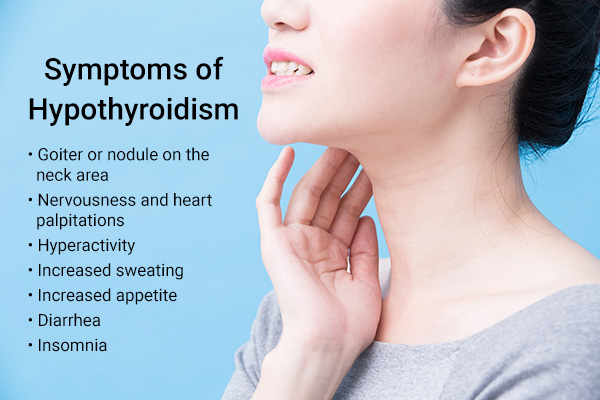In this article:
The thyroid is a tiny butterfly-shaped gland located in the neck that secretes certain hormones that play critical roles in several key physiological processes including metabolism, muscle function, digestion, mood, thermoregulation, and heart rate.

If this gland does not work properly, it will throw the thyroid hormones out of balance and hamper all these important body functions.
Two of the most common thyroid disorders are hypothyroidism and hyperthyroidism. Hypothyroidism is characterized by an underactive thyroid gland that does not produce enough thyroid hormones, whereas hyperthyroidism is characterized by an overactive thyroid gland that produces too much thyroid hormones.
Each of these conditions has its own set of adverse symptoms that can hamper your overall quality of life if left untreated.
According to the American Thyroid Association, over 20 million people in the United States are diagnosed with some type of thyroid disorder, which can affect people of all genders, but the risk is eight times higher in women than in men. (1)
Signs You May Have a Thyroid Problem
Here are some major warning signs of thyroid disease to look out for.
1. Fatigue
Women who feel tired all the time even after getting proper sleep may be struggling with an underactive thyroid gland (hypothyroidism). The thyroid gland secretes hormones that regulate metabolism and energy.
Hypothyroidism causes a deficiency of these hormones, which slows down your metabolism and decreases your energy levels, rendering you exhausted despite no physical exertion. (2)
This persistent tiredness is unlikely to go away with more hours of sleep or other lifestyle changes.
Middle-aged women often experience constant fatigue on account of menopause, but if it does not resolve even after taking estrogen, then hypothyroidism might be at play. (3)
2. Bowel issues
Thyroid hormones are involved in various digestive processes, including gastrointestinal (GI) motility. GI motility refers to the synchronized expansion and contraction of the muscles in the digestive tract to push food forward.
Hypothyroidism, or an underactive thyroid gland, lowers the amount of thyroid hormones in the body, thus slowing down gut motility and overall digestion, resulting in constipation and bloating. (4)
3. Muscle aches and trouble swallowing
If you experience muscle aches throughout the body without any discernible cause, it could be a sign of abnormal thyroid levels. (5)
In rare cases, thyroid dysfunction can also trigger muscle breakdown. So, if you are struggling to build muscle mass despite all your efforts, consult your doctor to rule out any underlying thyroid problems.
Given that the thyroid gland is located in the neck, these symptoms usually begin in that area and affect the muscles associated with swallowing. Thus, swallowing difficulties for no apparent reason could also indicate thyroid problems.

4. Anxiety and depression
Both hyperthyroidism and hypothyroidism can induce anxiety, but it is more common in the former.
An overactive thyroid gland produces excess thyroid hormones that accelerate your body’s metabolism. A high metabolism overstimulates the entire sympathetic nervous system, which makes you feel anxious.
An underactive thyroid gland, on the other hand, slows down metabolism, which means your body is unable to utilize energy properly. A sluggish metabolism, therefore, dulls down your entire body including the nervous system, resulting in feelings of fatigue, depression, and sometimes anxiety. The severity and prevalence of these symptoms increase with the severity of hypothyroidism. (6)
Moreover, abnormal thyroid levels can trigger an imbalance of neurotransmitters such as serotonin, which play a key role in promoting mental well-being. For instance, a lack of thyroid hormones can cause a dip in serotonin levels, which mostly causes depression but can trigger panic attacks too.
5. Increased heart rate (plus palpitations)
An excess of thyroid hormones in the body due to hyperthyroidism can make your heart beat faster in an irregular rhythm (atrial fibrillation) and with greater force such that you can feel it in the form of palpitations. (7)
An underactive thyroid can also make you more susceptible to high blood pressure, which, when combined with atherosclerosis, can trigger chest pains.
6. Weak nails and thinning hair
Thyroid hormones play a crucial role in facilitating hair and nail growth. Too much of these hormones can make your hair and nails grow a lot in a short period, which hampers their quality in the long run.
Your body has a limited amount of resources, nutrients, or raw materials to sustain healthy hair and nails, but this forced growth depletes them quickly. As a result, your hair and nails may grow faster, but they become thin and brittle over time.
7. Menstrual cycle changes
Both hyperthyroidism and hypothyroidism can disrupt or alter your menstrual cycle, but in different ways. (8)
High thyroid levels can decrease the volume of menstrual flow and increase the gap between your periods. Low thyroid levels, on the other hand, can increase the volume and duration of menstrual periods while reducing the gap between them.

8. Weight fluctuation
Rapid weight gain or loss without any changes in calorie intake and activity levels is one of the foremost signs of thyroid problems. (9)
Hypothyroidism slows down metabolism or the body’s ability to generate energy from food. The lack of energy keeps you from staying active and burning enough calories to maintain a healthy weight. The buildup of excess calories ultimately results in weight gain.
In contrast, hyperthyroidism produces too much thyroid hormones in the body, which speed up your metabolism to release too much energy.
The extra energy gets utilized by the body to burn plenty of calories in a short span. Expending more calories than you consume creates a calorie deficit, which ultimately results in weight loss. Thus, an overactive thyroid gland accelerates your metabolism to make you lose weight at a rapid rate.
9. Growth on the neck
If your thyroid gland becomes swollen or develops an overgrowth, it produces a bulge in the neck, which indicates extreme thyroid disorder. This condition was formerly referred to as goiter but now goes by the name of thyroid nodule. (10)
If you notice any such protrusion in the neck, consult your doctor right away.
10. Sleep problems
Thyroid imbalance can also trigger different kinds of sleep problems. (11)
An underactive thyroid does not produce enough thyroid hormones to sustain proper metabolism and keep you energized.
As discussed earlier, low thyroid levels deplete your body of energy, leaving you exhausted all the time, even after a good night’s sleep. Thus, you tend to remain drowsy and tired throughout the day whether or not you slept well the previous night.
Conversely, an overactive thyroid produces too much thyroid hormones that overenergize the body and drive away sleep.

11. You’re always hot or always cold, but never comfortable
An imbalance in thyroid hormones can adversely affect your body’s ability to regulate its core temperature.
An excess of thyroid hormones can make the body produce too much heat or energy, which makes you extra sensitive to high temperatures and induces excessive sweating. (12)
However, there is another facet to this. Your body breaks down fat cells to generate heat, but hyperthyroidism can trigger rapid weight loss, which can reduce the overall amount of fat stored in the body, thus making you extra sensitive to cold.
Meanwhile, a lack of thyroid hormones reduces the body’s ability to produce enough heat to keep itself comfortably warm.
At the same time, an underactive thyroid can trigger rapid weight gain, which will increase the total amount of fat stored in the body. The excess fat, in turn, will make you more prone to feeling hot.
Hypothyroidism and Hyperthyroidism
Get to know hypothyroidism and hyperthyroidism separately.
Hypothyroidism
Hypothyroidism, or myxedema, is a thyroid hormone deficiency. It causes characteristic features such as a hoarse voice and dry skin. It occurs more commonly in women and is commonly linked with diabetes mellitus.
Subclinical hypothyroidism is a condition where the levels of thyroid-stimulating hormone (TSH) are elevated but T4 levels are normal. (13)
What are the signs and symptoms of hypothyroidism?
Some common signs and symptoms of hypothyroidism are:

- Feeling very cold
- Weight gain due to fluid retention
- Carpal tunnel syndrome
- Irregular periods in women
- Forgetfulness
- Confusion, anorexia, incontinence, reduced mobility, etc., in older people
What is the treatment for hypothyroidism?
Treatment of this common usually revolves around treating the underlying cause and also administering thyroxine hormone. (13)
What is myxedema coma and is it really dangerous?
Myxedema coma is a condition caused by hypothyroidism.
Yes, it can be dangerous because severe hypothyroidism can cause a person to go into a coma with hypothermia (extremely low body temperature), seizures, trouble respirating, etc.
Myxedema can be caused by severely low levels of thyroid hormones combined with CNS suppressant medication, infections, illnesses, etc. (14)
Hyperthyroidism
Hyperthyroidism is a condition in which the levels of thyroid hormones are elevated in the body. It may cause a range of symptoms such as fatigue, heart palpitations, and anxiety.
Graves’ disease is the most common cause of hyperthyroidism.
Note: At times, certain medications may lead to hyperthyroidism. These include amiodarone, lithium, and interferon alfa. If you or anyone you know has been prescribed any medicines containing these drugs, they should be monitored for hyperthyroidism.
What are the signs and symptoms of hyperthyroidism?
The most common signs and symptoms of hypothyroidism are:
- Goiter or nodule on the neck area
- Nervousness and heart palpitations
- Hyperactivity
- Increased sweating
- Increased appetite
- Diarrhea
- Insomnia
Keep in mind that these symptoms may be mild to severe depending on individual conditions.
What is the treatment for hyperthyroidism?
Common medications and treatments used to treat hyperthyroidism are:
- Propylthiouracil or methimazole
- β-blockers
- Iodine
- Radioactive iodine
- Rarely, surgical procedures (15)
Pregnancy, Abortions, and Hypothyroidism: Is There a Link?
Yes. Several research studies suggest that thyroid issues can affect pregnancies. Hypothyroidism and hyperthyroidism can increase your risk of pre-eclampsia, miscarriages, etc. (16)
Final Word
It is vital that you educate yourself about the warning signs of thyroid disorder and seek immediate medical help if you notice any. Early diagnosis and treatment can help facilitate a speedy recovery and avoid undue complications later.
Unfortunately, the root cause of thyroid dysfunction is still not clearly understood, which makes it difficult to diagnose and prevent. The good news is there are medications along with favorable lifestyle interventions that can help correct the hormonal imbalance.
- Was this article helpful?
- YES, THANKS!NOT REALLY


